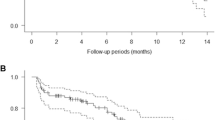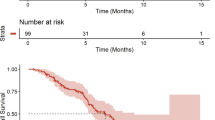Abstract
Purpose
Conatumumab is a fully human monoclonal agonist antibody against human death receptor 5 (DR5). The primary objectives of this phase 1 study were to assess the safety, tolerability, and pharmacokinetics (PK) of conatumumab in Japanese patients with advanced solid tumors.
Methods
This is an open-label ascending dose study with a starting dose level of 3 mg/kg. Subsequent doses of 10 and 20 mg/kg were planned. Six patients were enrolled into 1 of 3 dose cohorts (3, 10, or 20 mg/kg) of conatumumab administered intravenously once every 2 weeks as a single agent. No conatumumab was administered on day 43 to allow the assessment of terminal PK parameters. The primary endpoints were the incidence of dose-limiting toxicities (DLTs) and assessment of PK parameters of conatumumab.
Results
Eighteen patients received at least 1 dose of conatumumab. There were no DLTs observed as defined in the protocol. No patients had an adverse event leading to conatumumab discontinuation. Conatumumab demonstrated dose-linear kinetics. A best response of stable disease was reported in nine patients. Monocytes were found to express DR5 and showed a high degree of conatumumab receptor occupancy after treatment at all dose levels.
Conclusions
Conatumumab administered up to 20 mg/kg once every 2 weeks was well tolerated in Japanese patients with advanced solid tumors. Adverse events and PK in these patients were similar to those in the first in human (FIH) study.

Similar content being viewed by others
References
Pitti RM, Marsters SA, Rupper S et al (1996) Induction of apoptosis by Apo-2 ligand, a new member of the tumor necrosis factor cytokine family. J Biol Chem 271:12687–12690
Wiley SR, Schooley K, Smolak PJ et al (1995) Identification and characterization of a new member of the TNF family that induces apoptosis. Immunity 3:673–682
Kelly S, Ashkenazi A (2004) Targeting death receptors in cancer with Apo2L/TRAIL. Curr Opin Pharmacol 4:333–339
Fesik SW (2005) Promoting apoptosis as a strategy for cancer drug discovery. Nat Rev Can 5:876–885
DeRosier LC, Vickers SM, Zinn KR et al (2007) TRA-8 anti-DR5 monoclonal antibody and gemcitabine induce apoptosis and inhibit radiologically validated orthotropic pancreatic tumor growth. Mol Cancer Ther 6(12 pt1):3198–3207
DeRosier LC, Huang ZQ, Sellers JC et al (2006) Treatment with gemcitabine and TRA-8 anti-death receptor-5 mAb reduces pancreatic adenocarcinoma cell viability in vitro and growth in vivo. J Gastrointest Surg 10:1291–1300
Ibrahim SM, Ringel J, Schmidt C et al (2001) Pancreatic adenocarcinoma cell lines show variable susceptibility to TRAIL-mediated cell death. Pancreas 23:72–79
Xu ZW, Kleeff J, Friess H et al (2003) Synergistic cytotoxic effect of TRAIL and gemcitabine in pancreatic cancer cells. Anticancer Res 23:251–258
Hylander BL, Pitoniak R, Penetrante RB et al (2005) The anti-tumor effect of Apo2L/TRAIL on patient pancreatic adenocarcinomas grown as xenografts in SCID mice. J Transl Med 3:22
LoRusso P, Hong D, Heath E et al (2007) First-in-human study of AMG 655, a pro-apoptotic TRAIL receptor-2 agonist, in adult patients with advanced solid tumors. ASCO Meeting Abstracts 25:3534
Ashkenazi A (2002) Targeting death and decoy receptors of the tumor-necrosis factor superfamily. Nat Rev Cancer 2(6):420–430
Johnstone RW, Frew AJ, Smyth MJ et al (2008) The TRAIL apoptotic pathway in cancer onset, progression and therapy. Nat Rev Cancer 8:782–798
Ashkenazi A, Pai RC, Fong S et al (1999) Safety and antitumor activity of recombinant soluble Apo2 ligand. J Clin Invest 104:155–162
Kaplan-Lefko P, Bush T, Belmontes B et al (2008) AMG 655, a fully human agonistic antibody against death receptor 5, enhances the anti-tumor activity of gemcitabine in MiaPaCa2/T2, a pancreatic cancer model. AACR Meeting Abstracts 49:3999
Calogiuri G, Ventura MT, Mason L et al (2008) Hypersensitivity to last generation chimeric, umanized and human recombinant monoclonal antibodies for therapeutic use. Curr Pharmaceutical Design 14:2883–2891
Camidge D, Herbst RS, Gordon M et al (2007) A phase I safety and pharmacokinetic study of Apomab, a human DR5 agonist antibody, in patients with advanced cancer. ASCO Meeting Abstracts 25:3582
Tolcher AW, Mita M, Meropol NJ et al (2007) Phase I pharmacokinetic and biologic correlative study of mapatumumab, a fully human monoclonal antibody with agonist activity to tumor necrosis factor-related apoptosis-inducing ligand receptor-1. J Clin Oncol 25:1390–1395
Plummer R, Attard G, Pacey S et al (2007) Phase 1 and pharmacokinetic study of lexatumumab in patients with advanced cancers. Clin Cancer Res 13:6187–6194
Patnaik A, Wakelee H, Mita M et al (2006) HGS-ETR2—A fully human monoclonal antibody to TRAIL-R2: results of a phase I trial in patients with advanced solid tumors. ASCO Meeting Abstracts 24:3012
Lobo ED, Hansen RJ, Balthasar JP (2004) Antibody pharmacokinetics and pharmacodynamics. J Pharmaceut Sci 93:2645–2668
Griffith TS, Wiley SR, Kubin MZ et al (1999) Monocyte-mediated tumoricidal activity via the tumor necrosis factor-related cytokine, TRAIL. J Exp Med 189:1343–1353
Washburn B, Weigand MA, Grosse-Wilds A et al (2003) TNF related apoptosis-inducing ligand mediates tumoricidal activity of human monocytes stimulated by Newcastle disease virus. J Immunol 170:1814–1821
Hayakawa Y, Screpanti V, Yagita H et al (2004) NK cell TRAIL eliminates immature dendritic cells in vivo and limits dendritic cell vaccination efficacy. J Immunol 172:123–129
Wilson NS, Dixit V, Ashkenzi A et al (2009) Death receptor signal transducers: nodes of coordination in immune signaling networks. Nat Immunology 10(4):348–355
Sheridan JP, Marsters SA, Pitti RM et al (1997) Control of TRAIL-induced apoptosis by a family of signaling and decoy receptors. Science 277:818–821
Walczak H, Miller RE, Ariail K et al (1999) Tumoricidal activity of tumor necrosis factor-related apoptosis-inducing ligand in vivo. Nat Med 5(2):157–163
Pollack IF, Eriff M, Ashkenazi A (2001) Direct stimulation of apoptotic signaling by soluble Apo2L/tumor necrosis factor-related apoptosis-inducing ligand leads to selective killing of glioma cells. Clin Cancer Res 7:1362–1369
Lamhamedi-Cherradi SE, Zheng SJ, Maguschak KA et al (2003) Defective thymocyte apoptosis and accelerated autoimmune diseases in TRAIL−/− mice. Nat Immunol 4:255–260
Cretney E, Takeda K, Yagita H et al (2002) Increased susceptibility to tumor initiation and metastasis in TNF-related apoptosis-inducing ligand-deficient mice. J Immunol 168:1356–1361
Diehl GE, Yue HH, Hsieh K et al (2004) TRAIL-R as a negative regulator of innate immune cell responses. Immunity 21:877–889
Pan Y, Xu R, Peach M, et al (2007) Application of pharmacodynamic assays in a phase Ia trial of Apo2L/TRAIL in patients with advanced tumors. ASCO Meeting Abstracts, 3535
Acknowledgments
We would like to thank Francesca Civoli and Steven J. Swanson for clinical immunology analysis and John Thomas for providing training at Mitsubishi Chemical Medience Cooperation (Tokyo, Japan) to evaluate receptor occupancy by flow cytometry. Takeda Bio Development Center Ltd., Tokyo, Japan.
Author information
Authors and Affiliations
Corresponding author
Rights and permissions
About this article
Cite this article
Doi, T., Murakami, H., Ohtsu, A. et al. Phase 1 study of conatumumab, a pro-apoptotic death receptor 5 agonist antibody, in Japanese patients with advanced solid tumors. Cancer Chemother Pharmacol 68, 733–741 (2011). https://doi.org/10.1007/s00280-010-1544-1
Received:
Accepted:
Published:
Issue Date:
DOI: https://doi.org/10.1007/s00280-010-1544-1




